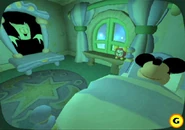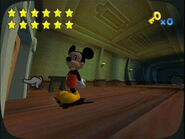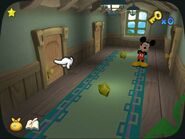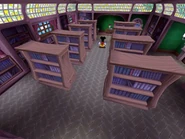Disney's Magical Mirror Starring Mickey Mouse (known in Japan as: Mickey Mouse no Fushigi no Kagami) is a 2002 Mickey Mouse adventure video game developed by Capcom, published by Nintendo, and distributed by Disney Interactive Studios for the Nintendo GameCube.
Gameplay
The game uses a simple point-and-click mechanic which involves using a cursor to guide Mickey Mouse to various locations. Mickey will react to what the player does and what he encounters in the game by expressing curiosity, getting mad, falling down, running away, standing his ground, or other actions. At certain points, the player is able to have Mickey perform a special move that generally involves having him stomp on an on-screen enemy.
Mini-games, such as having Mickey fly an aeroplane or ski down a mountain, are available throughout the game. Special souvenirs may be uncovered as well, which are displayed in Mickey's room at the end of the game, such as Pluto's collar or Minnie's bow.
Plot
One night, a mischievous ghost traps a sleep-walking Mickey Mouse inside a magic mirror. Stuck in an alternate universe that strangely resembles his own house, Mickey yearns to get back through the mirror to his own house and his own bed. The player must direct Mickey to outwit enemies and pull gags in order to get past enemies and the aforementioned ghost and recover the broken mirror pieces he needs to go home again and search for twelve magic stars and items needed to help him throughout his quest. Whenever he finds a piece, it will fly back to the mirror and put itself back in place. After repairing the mirror, he prepares to leave but the ghost stops him revealing that it only brought him here so he can have someone to play with. The player could either chose to stay or go. If the player chooses to stay, the ghost then runs off, leaving Mickey stuck in the alternate world until he renters the mirror room where the leave or stay process repeats. If the player chooses to leave, Mickey says goodbye to the ghost and begins to go home, but the ghost decides to go with him. However, if the player doesn't find all the mirror pieces and has only found at least eight pieces, Mickey can still leave, but the ghost can't leave with him at all. After Mickey wakes up, he goes downstairs to get something to eat and a model of the ghost is shown hanging on the ceiling fan and the ghost's laughter is heard.
Development
At Nintendo's Space World 2001 show, where it was just beginning to show more Nintendo GameCube titles, A Disney title was announced which showed some screenshots of this game, which was assumed to be a platformer like much the vein of Disney's Magical Quest on the Super Nintendo. But when Nintendo finally announced the product at the 2002 Electronic Entertainment Expo, This was proved that it was a completely different game, instead.
This game's plot was based on "Thru the Mirror", a 1936 Mickey Mouse cartoon. The opening sequence also plays out similar to the beginning of the cartoon, even perfectly replicating Mickey's "walk through the mirror" animation (similarly, this would also be used in the intro sequence to Junction Point's Epic Mickey). One part later in the game, where Mickey grows to a tremendous size then shrinks to a minuscule size, was also replicated exactly as in the cartoon.
Cast
- Wayne Allwine - Mickey Mouse
- Dallas McKennon - The Ghost (archive footage - uncredited)
Reception
The game was generally given poor review scores. For the most part, the player is given no instructions and cut-scenes are limited to watching Mickey get chased or falling through to the next area. The game was also criticized because the controls are unreasonably unresponsive as Mickey will just wander off on his own even if players tell him otherwise. The game also has a 2.9/5 rating on Amazon with 37 reviews.
Gallery
See also
| This page uses content from the English Wikipedia page Disney's Magical Mirror Starring Mickey Mouse. The list of authors can be seen in the page history. Text from Wikipedia is available under the Creative Commons Attribution-ShareAlike License; additional terms may apply. |
































